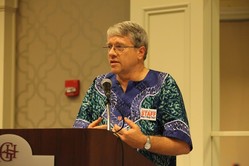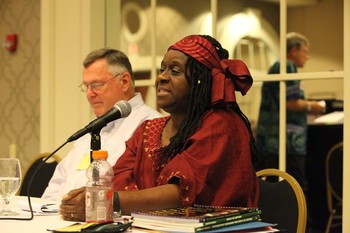On the second day of keynote speaker Bob Lupton’s time with World Mission at Big Tent, attendees were invited to ask questions.
The first question at the luncheon got right to the point: “Isn’t this (talking about misguided mission practices) discouraging mission involvement?”
Lupton responded with a question: “I ask the question, ‘Is bad, hurtful service better than no service at all?’”
He compared it to medical attention from a physician that hurts the patient. Lupton is the author of “Toxic Charity” and his presentations at the World Mission Pre-Conference and the conference at Big Tent have concentrated around the central idea that mission sometimes lead us to do things that sound great and feel wonderful to the donor ― but ultimately hurt the recipient.
Instead, mission organizations should invite partnerships that involve those being served. That’s been the focus of presentations throughout World Mission’s Pre-Conference and Conference at Big Tent, Aug. 1-3. Big Tent is a celebration of Presbyterian Church (U.S.A.) mission and ministry. It’s composed of 10 national Presbyterian conferences, more than 160 workshops and other special events to mark the 30th anniversary of Presbyterian reunion and the 25th anniversary of the opening of the Presbyterian Center here.
Frank Dimmock, poverty alleviation catalyst for Presbyterian World Mission, shared with the audience that the key initiative in poverty alleviation for World Mission in the coming years is education, specifically reaching this goal: Educating 100,001 more children around the world by 2020.

Frank Dimmock speaks to World Mission conference at Big Tent. —Danny Bolin
“Education promotes human development, and basic literacy is a gateway skill that empowers the poor to emerge from poverty,” Dimmock said. “Extensive research has shown that a quality education, regardless of gender, wealth, location, ethnicity or language, is the best pathway out of poverty. It drives development.”
Lupton noted that education is key to dealing with poverty, and it will only be achieved in partnership.
Another question asked how church leaders can take the message that mission may need to change to their congregations and Sessions “without shooting the sacred cow.”
“This isn’t the mission of the Presbyterian church,” said Suzette Goss-Geffrard, a PC(USA) mission worker in Haiti. “This is the mission of God… We need to understand that being in mission in partnership with God and those God has allowed the privilege of being in ministry is going to give us the meaning we need to be the people of God.”
Lest those who want to do good think it’s too hard, too complicated and takes too long, Goss-Geffrard said it’s possible to redeem the more traditional act of kindness that result in a negative unintended consequence.
She told the story of how a missionary worker gathered used clothing and shipped it to Haiti for those who needed it. But what he didn’t realize was that free clothing would nearly wipe out the jobs of local tailors.
Two decades later, entrepreneurs made a business of importing used clothing, providing a way to make a living for themselves and their employees. And enterprising women began to transform the used clothing items and gained a way to make a living. “It was an unintended consequence, made good by God,” Goss-Geffrard said.

